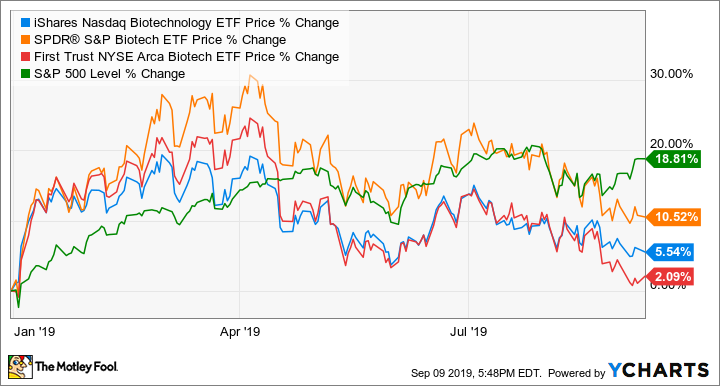Biotechnology stocks get a lot of attention. It's easy to be enamored with the curing of disease, and the financial results that could follow the successful introduction of a new treatment can be game-changing.
But, alas, it isn't as simple as picking a few promising names with lucrative treatment pipelines, sitting back, and watching the positive results roll in. Biotechnology certainly has the potential to be a high-reward investment, but there are extra risks tethered to the industry. Many upstart companies hold a lot of promise, but the path to treatment approval and sales growth is fraught with legal disputes, regulatory and health concerns, and -- oh yeah -- all the other challenges involved with running a business!
Enter the iShares Nasdaq Biotechnology Index Fund (IBB -0.99%). If the ins and outs of the biotech industry are beyond your scope of expertise (like myself), or you lack the time to sift through proposed treatments, trials, and regulatory approval (that's me, too), this ETF could be worth a look.

Image source: Getty Images.
What is iShares Biotechnology Index Fund?
iShares Biotechnology Fund is the oldest and largest biotechnology fund around. Fired up all the way back in 2001, a share of this ETF carries an expense ratio of 0.47% a year; so every $1,000 invested gets hit with a $4.70 charge throughout the year, assuming the value of the fund doesn't change. For that fee, investors get exposure to 219 stocks, passively managed and weighted by the size of the company. In other words, the larger the underlying stock, the larger its percentage of iShares Biotechnology Fund. As of this writing, the fund's top five and well-known holdings read as such:
|
Top Five Holdings From iShares Nasdaq Biotechnology Fund |
Company Market Cap |
Portfolio Weighting |
|---|---|---|
|
Amgen (AMGN -0.50%) |
$121 billion |
9.8% |
|
Gilead Sciences (GILD -1.15%) |
$84.0 billion |
8.2% |
|
Celgene (CELG) |
$68.4 billion |
8.2% |
|
Vertex Pharmaceuticals (VRTX 0.10%) |
$44.9 billion |
6.4% |
|
Illumina (ILMN -1.35%) |
$39.2 billion |
5.4% |
Data source: iShares and YCharts.
Stacking up against the competition
iShares is by no means the only game in town for biotech funds, though. For example, there's the SPDR S&P Biotech ETF (XBI -1.38%) and First Trust NYSE Arca Biotech ETF (FBT -1.52%), also large and well-established funds with a long track record. Both SPDR and First Trust use an equal-weight portfolio -- meaning all underlying stocks large and small are periodically rebalanced so that regardless of the companies' size, they all have the same portfolio weighting. After rebalancing, these weights will change as the stocks increase and decrease in value, but the strategy nevertheless significantly changes what investors should expect from the funds when compared with iShares' offering.
For one, SPDR S&P Biotech and First Trust NYSE Arca Biotech have fewer holdings -- 118 and 30 stocks, respectively. They also are more heavily weighted toward smaller companies. Since smaller outfits have more upward potential if they land a new blockbuster treatment, these funds have outperformed iShares over the long term. The trade-off, though, is that having fewer underlying stocks and concentrating more on smaller companies means potentially more of a roller coaster ride.
Data by YCharts.
Is it a buy?
The biotech industry is one of the more uncorrelated groups of stocks compared with the rest of the stock market. After all, viable new treatments for illness don't wait for the economy before going to market, nor do they necessarily take off when all's well in the world of economics. That can be either a good thing or a bad thing. Take this year for example. While the S&P 500 is sporting a 19% gain in 2019 year to date, an initial rally for biotechs has fizzled as of late.
Data by YCharts.
So, is iShares Biotechnology Fund a buy? That depends. This is a volatile place to put money, but if an investor has a long time to wait out the craziness, there's certainly a lot of growth potential. Of course, the largest biotech ETF should be considered against its peers, and if high growth with an indifference to wild gyrations in value is what you're after, the SPDR S&P Biotech and First Trust NYSE Arca Biotech funds should be considered as well.
At the end of the day, though, the iShares Nasdaq Biotechnology Index Fund offers exposure to a wide swath of the industry, has an internal expense fee on par with other ETFs vying for your biotech dollars, and has a track record of delivering above-average gains over the long haul. It's not a bad choice as part of a long-term focused and well-diversified portfolio if you don't have the time or the expertise to tackle biotechnology.



